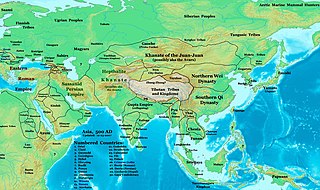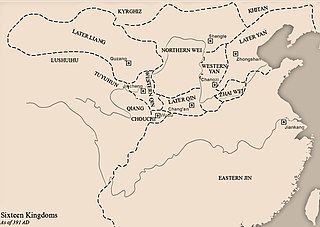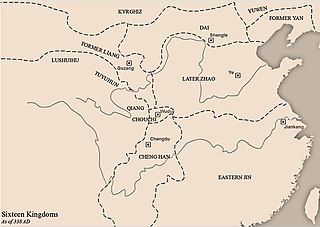During Murong Chui's reign
Throughout the next few years, Murong Long largely served as a general directly under his father's command, as Later Yan tried to establish itself over the old territory of Former Yan. In 384, when Murong Chui was nearly trapped by an ambush by the Former Qin viceroy Fu Pi, Murong Long was the one who rescued him from the encounter. In 386, Murong Chui created him the Prince of Gaoyang. He continued to distinguish himself in campaigns against independent warlords and Jin generals. In 389, when his brother Murong Nong, himself a distinguished general, was recalled from his post as viceroy at the old Former Yan capital Longcheng (龍城, in modern Jinzhou, Liaoning), Murong Long replaced him as viceroy, and he followed Murong Nong's policies. The populace favored him as much as Murong Nong.
A viceroy is an official who runs a country, colony, city, province, or sub-national state, in the name of and as the representative of the monarch of the territory. The term derives from the Latin prefix vice-, meaning "in the place of" and the French word roy, meaning "king". A viceroy's territory may be called a viceroyalty, though this term is not always applied. The adjective form is viceregal, less often viceroyal. The term vicereine is sometimes used to indicate a female viceroy suo jure, although viceroy can serve as a gender-neutral term. Vicereine is more commonly used to indicate a viceroy's wife.
Fu Pi, courtesy name Yongshu (永叔), formally Emperor Aiping of (Former) Qin ( 秦哀平帝), was an emperor of the Chinese/Di state Former Qin. He was Fu Jiān's oldest son, although not his crown prince, and after Fu Jiān's death at the hands of Yao Chang, the founder of Later Qin, and his brother Fu Hong (苻宏) the Crown Prince was forced to flee to Jin, he claimed imperial title in 385, but was defeated by the Western Yan prince Murong Yong in 386, and then subsequently killed by the Jin general Feng Gai (馮該).
Murong Nong (慕容農), formally Prince Huanlie of Liaoxi (遼西桓烈王), was a general and imperial prince of the Chinese/Xianbei state Later Yan. He was a son of the founding emperor Murong Chui and a brother of Murong Bao. Throughout most of the state's history, he was admired by the people and officials alike for his military and governance abilities, but his inexplicable failures in 398 helped to lead to the downfall of himself, his brother Murong Bao, and the Later Yan state.
During Murong Chui's reign, Murong Nong and Murong Long were the most well-regarded princes. Because of this, Murong Chui's wife Empress Duan Yuanfei once suggested to him that the crown prince Murong Bao lacked abilities to govern, and Murong Chui should choose either Murong Nong or Murong Long instead. Murong Chui, believing Murong Bao to be capable, rejected her suggestion.

A crown prince is the male heir apparent to the throne in a royal or imperial monarchy. Its female form is crown princess, which may refer either to an heir apparent or, especially in earlier times, the wife of the person styled crown prince.
Murong Bao, courtesy name Daoyou (道佑), formally Emperor Huimin of (Later) Yan ( 燕惠愍帝), temple name Liezong (烈宗) or Liezu (烈祖), was an emperor of the Chinese/Xianbei state Later Yan. He inherited from his father Murong Chui a sizable empire but lost most of it within a span of a year, and would be dead in less than three, a victim of a rebellion by his granduncle Lan Han. Historians largely attributed this to his irresolution and inability to judge military and political decisions. While Later Yan would last for one more decade after his death, it would never regain the power it had under Murong Chui.
Around the new year 396, after an army commanded by Murong Bao had suffered a crushing defeat by Northern Wei's prince Tuoba Gui at the Battle of Canhe Slope, Murong Chui planned a second campaign against Northern Wei, and he recalled Murong Long and his troops back to the capital Zhongshan (中山, in modern Baoding, Hebei), replacing him as viceroy with Murong Bao's son Murong Hui the Duke of Qinghe. With Murong Long's fresh troops leading the way and with Murong Long and Murong Nong as forward commanders, the campaign against Northern Wei was initially successful, but as the army passed through Canhe Slope, they mourned in such a great manner that Murong Chui, in shame and anger, grew ill, and the army was forced to retreat. He died soon thereafter and was succeeded by Murong Bao.

The Northern Wei or the Northern Wei Empire, also known as the Tuoba Wei (拓跋魏), Later Wei (後魏), or Yuan Wei (元魏), was a dynasty founded by the Tuoba clan of the Xianbei, which ruled northern China from 386 to 534 AD, during the period of the Southern and Northern Dynasties. Described as "part of an era of political turbulence and intense social and cultural change", the Northern Wei Dynasty is particularly noted for unifying northern China in 439: this was also a period of introduced foreign ideas, such as Buddhism, which became firmly established.
Emperor Daowu of Northern Wei ( 魏道武帝) (371–409), personal name Tuoba Gui (拓拔珪), né Tuoba Shegui (拓拔渉珪), was the founding emperor of the Northern Wei. He was the grandson of the last prince of Dai, Tuoba Shiyijian, and after the fall of the Dai state to Former Qin in 376 had been presumed to be the eventual successor to the Dai throne. After Former Qin fell into disarray in 383 following its defeat by Jin forces at the Battle of Fei River, Tuoba Gui took the opportunity to reestablish Dai in 386, but soon changing the state's name to Wei and declared himself a prince. He was initially a vassal of Later Yan. However, after he defeated the Later Yan emperor Murong Bao in 397 and seized most of Later Yan's territory, he claimed imperial title in 398.

Battle of Canhe Slope (參合陂之戰) refers to a battle in 395 where the Chinese/Xianbei state Later Yan, then ruling over northern and central China, had launched a punitive campaign against its former vassal Northern Wei, also of Xianbei extraction. Later Yan forces were led by its crown prince Murong Bao and enjoyed some initial successes, but after being frustrated by the containment strategy by Northern Wei's prince Tuoba Gui, withdrew. Tuoba Gui then gave chase and crushed Later Yan forces at Canhe Slope (Canhebei,参合陂). He captured a large number of Later Yan forces as captive, but in fear that releasing them would allow a future Later Yan campaign against Northern Wei, slaughtered them. The battle reversed the power relations between Later Yan and Northern Wei. After Later Yan's emperor Murong Chui died in 396 and Murong Bao succeeded to the throne, Northern Wei would launch a debilitating campaign of conquest against Later Yan, and by 398 had captured most of Later Yan's territory, reducing Later Yan to a small regional state.
During Murong Bao's reign
Murong Bao, although aware of Empress Duan's earlier suggestion to make Murong Nong or Murong Long crown prince (and in fact was so resentful of it that he forced her to commit suicide), appeared to trust his brothers greatly. However, in fall 396, Northern Wei launched a major campaign against Later Yan, and Tuoba Gui, after defeating Murong Nong and seizing Bing Province (并州, modern central and northern Shanxi), then advanced against Zhongshan. Murong Bao put another brother, Murong Lin the Prince of Zhao, in charge of Zhongshan's defenses, and Murong Lin advocated the strategy of defending the city and not engaging Northern Wei, much to Murong Long and Murong Nong's frustration.

Shanxi is a province of the People's Republic of China, located in the North China region. Its one-character abbreviation is "晋", after the state of Jin that existed here during the Spring and Autumn period.
Murong Lin was a general and imperial prince of the Chinese/Xianbei state Later Yan. He was a son of the founding emperor Murong Chui and a brother of Murong Bao ; for a while, he himself was a pretender to the Later Yan throne. He was known both for his abilities and his treachery, and he betrayed both his father and his brothers Murong Ling (慕容令) and Murong Bao on separate occasions. Eventually, he was executed by his uncle Murong De, the founder of Southern Yan.
In spring 397, after Murong Lin failed in a coup attempt, he fled out of the capital, and Murong Bao, in fear that Murong Lin would seize a relief force commanded by his son Murong Hui the Prince of Qinghe, decided to abandon Zhongshan. Murong Nong's and Murong Long's subordinates tried to persuade each to stay in Zhongshan rather than to follow Murong Bao, but each refused, feeling that loyalty to their brother required them to follow him. They therefore followed Murong Bao and joined Murong Hui's army.
However, Murong Hui was resentful that he was not made crown prince, a position given to his younger brother Murong Ce (慕容策), and he considered seizing the position by force. Murong Bao, realizing this, tried to transfer some of Murong Hui's army to the commands of Murong Nong and Murong Long, but this only made Murong Hui more resentful, and he acted first against his uncles, sending assassins against them. Murong Long was killed, but Murong Nong survived the attack but was severely wounded (described as having suffered a wound so deep that his brain was visible), and Murong Hui, who then openly declared a coup, was then defeated and killed.
Murong Huang, courtesy name Yuanzhen (元真), formally Prince Wenming of (Former) Yan ( 燕文明王) was a ruler of the Xianbei state Former Yan and the commonly recognized founder of the state. When he first succeeded his father Murong Hui in 333, he carried the Jin Dynasty (265-420)-bestowed title Duke of Liaodong, but in 337 claimed the title of Prince of Yan, which is traditionally viewed as the founding date of Former Yan. After his son Murong Jun completely broke away from Jin and claimed the title of emperor in 353, he was posthumoustly honored as Emperor Wenming of (Former) Yan with the temple name Taizu (太祖).
Murong Jun, courtesy name Xuanying (宣英), formally Emperor Jingzhao of (Former) Yan ( 燕景昭帝), was an emperor of Former Yan. He was the state's second ruler, but after first using the Jin Dynasty (265-420)-created title of Prince of Yan, was the first to use imperial title, as during his reign the state expanded from possessing merely modern Liaoning and parts of Hebei to nearly all of the territory north of the Yellow River and some substantial holdings south of the Yellow River.
Empress Kezuhun was an empress consort and empress dowager of the Chinese/Xianbei state Former Yan. Her husband was Murong Jun, who was succeeded by their son Murong Wei.
Murong Ping (慕容評) was a regent of the Chinese/Xianbei state Former Yan during the reign of Murong Wei, after the death of the previous, far more capable regent Murong Ke. He, along with Murong Wei's mother Empress Dowager Kezuhun, is often blamed for Former Yan's decline and fall.
Murong Yong, courtesy name Shuming (叔明), was the last emperor of the Xianbei state Western Yan. He was the grandson of Murong Yun (慕容運), the uncle of Former Yan's founder Murong Huang. As a member of Former Yan's imperial clan, he was moved to Guanzhong, Former Qin's capital region, when Former Qin destroyed Former Yan in 370. He was described as poor, and he and his wife made their living by selling boots.
Murong Chui, courtesy name Daoming (道明), formally Emperor Wucheng of (Later) Yan ( 燕武成帝) was a great general of the Chinese/Xianbei state Former Yan who later became the founding emperor of Later Yan. He was a controversial figure in Chinese history, as his military abilities were plain, but as he was forced to flee Former Yan due to the jealousies of the regent Murong Ping, he was taken in and trusted by the Former Qin emperor Fu Jiān, but later betrayed him and established Later Yan, leading to a reputation of him as a traitor. Further, his reputation was damaged in that soon after his death, the Later Yan state suffered great defeats at the hands of Northern Wei Dynasty's founder Emperor Daowu, leading to the general sense that Murong Chui contributed to the defeats by not building a sound foundation for the empire and by choosing the wrong successor.
Duan Yuanfei (段元妃), formally Empress Cheng'ai, was an empress of the Chinese/Xianbei state Later Yan. Her husband was the state's founding emperor, Murong Chui. Her given name is lost to history, but her courtesy name Yuanfei was recorded. She was the niece of two of Murong Chui's prior wives, who were daughters of the Xianbei chief Duan Mopei (段末怌). Her father Duan Yi (段儀) was a brother of the Princesses Duan.
Murong Hui (慕容會) (373–397) was a general and imperial prince of the Xianbei state Later Yan, who served under his grandfather Murong Chui and father Murong Bao. During his father's reign, angry that he was not created crown prince, he tried to seize that position by force, but after his failure was killed.
Empress Murong, formally Empress Daowu (道武皇后), was an empress of the Chinese/Xianbei dynasty Northern Wei Dynasty. Her husband was the founding emperor Emperor Daowu.
Murong Sheng, courtesy name Daoyun (道運), formally Emperor Zhaowu of (Later) Yan ( 燕昭武帝), was an emperor of the Xianbei state Later Yan. He was the oldest son of Murong Bao, and after Murong Bao was killed by Lan Han avenged his father in a coup and took the throne. For a large part of his reign, he used the title "Commoner Heavenly Prince" instead of emperor.
Murong De, name changed in 400 to Murong Beide (慕容備德), courtesy name Xuanming (玄明), formally Emperor Xianwu of (Southern) Yan ( 燕獻武帝), was the founding emperor of the Chinese/Xianbei state Southern Yan. He was the son of Former Yan's founding prince Murong Huang and younger brother to both Former Yan emperor Murong Jun and Later Yan emperor Murong Chui, and therefore was an imperial prince and general during the times of both states. After Murong Chui's son Murong Bao lost most of Later Yan's territory to Northern Wei, Murong De took troops under his own command south and established Southern Yan, which secured modern Shandong, but failed to expand further, and was destroyed by Jin Dynasty (265-420) after Murong De's death and succession by his nephew Murong Chao.
Murong Xi, courtesy name Daowen (道文), formally Emperor Zhaowen of (Later) Yan ( 燕昭文帝), was an emperor of the Xianbei state Later Yan. He was one of the youngest sons of Murong Chui, and after the death of his nephew Murong Sheng became emperor due to his affair with Murong Sheng's mother, Empress Dowager Ding. He was regarded as a cruel and capricious ruler, who acted at the whims of himself and his wife, Empress Fu Xunying, greatly damaging the Later Yan state. After Empress Fu died in 407, he left the capital Longcheng to bury her, and the soldiers in Longcheng took this chance to rebel and replace him with Murong Bao's adopted son Murong Yun, and Murong Xi himself was captured and killed.
Gao Yun (高雲),, at one time Murong Yun (慕容雲), courtesy name Ziyu (子雨), formally Emperor Huiyi of (Later)/(Northern) Yan, was an emperor who, depending on the historian's characterization, was either the last emperor of the Xianbei state Later Yan, or the first emperor of its succeeding state Northern Yan. He was ethnically Korean and a descendant of the royal house of Goguryeo, whose ancestors were captured by Former Yan. He was adopted into the Later Yan imperial house after helping the emperor Murong Bao put down a rebellion by Murong Bao's son Murong Hui. He became emperor after the people rebelled against the despotic rule of his adoptive uncle Murong Xi, and during his reign, he used the title "Heavenly Prince". In 409, he was assassinated, and after a disturbance, was replaced by his ethnic Han chinese general Feng Ba.








